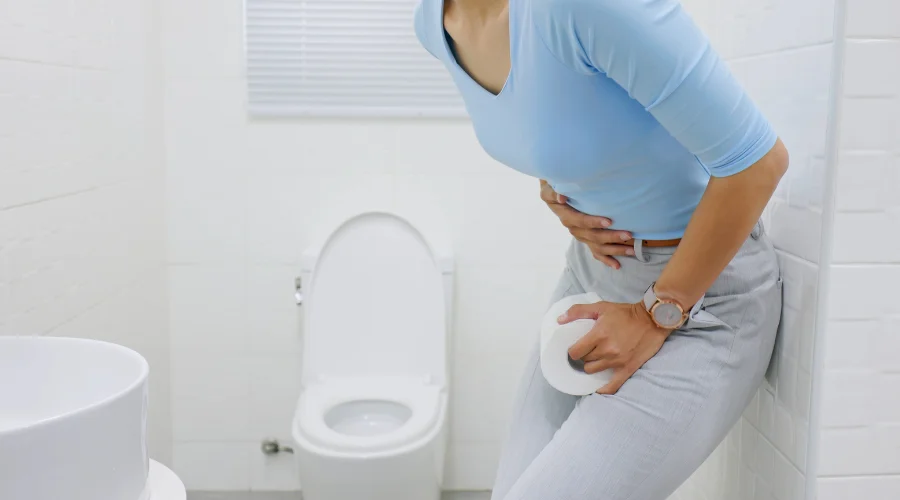The uncomfortable sensation of burning during or after urinating stands as a condition that’s prevalent worldwide and affects millions of people.
While the level of discomfort during urination varies between mild irritation to severe pain, one thing is certain; this condition will interfere with the daily routine of most sufferers.
In fact, the burning sensation may also have some accompanying symptoms that are equally disconcerting. You may have frequent urination needs, urgency to urinate, or you might also be noticing changes in urine colour.
In any case, the prevalence of urinary burning sensation should not be taken for granted. These issues usually signal an underlying health problem that needs proper medical examination.
Urinary burning may have causes such as infections, inflammation, irritation caused by specific foods or medications as well as severe conditions that affect the urinary tract. Understanding the root causes is highly important to get long-term relief from this kind of urinary discomfort.
This how-to guide today provides strategies for instant relief and long-term treatments along with preventive measures to help you get rid of uncomfortable urinary sensations.
How to Stop Burning Sensation After Urinating?
A urologist will first diagnose you to identify the root cause behind the burning sensation in urination. At the same time, you’ll most likely get medications for immediate symptom relief.
The majority of these cases happen due to urinary tract infections (UTIs) that need proper medical diagnosis followed by antibiotic treatment.
In cases where you have persistent symptoms, it’s best to not wait around. You can choose to seek expert evaluation and treatment for persistent or severe symptoms from a super speciality hospital in Patna.
To start the treatment, doctors usually use essential diagnostic procedures, such as urinalysis, cultures, and imaging studies. These help pinpoint the specific reason behind your symptoms.
There are also several home-based interventions that can help mitigate symptoms and support healing until your appointment.
However, note that these remedies are only for relief and cannot replace medical options. Professional medical advice is more often than not required because of the dire nature of this condition.
Stop Burning Sensation After Urinating Immediately: Relief Remedies

Home remedies can offer quick relief from burning sensation after urination as you wait for your doctor’s appointment.
During episodes of urinary discomfort, people can use these relief strategies immediately and alongside schedule a meeting with their healthcare provider.
It’s important to remember that the treatment strategy will vary based on what’s causing your symptoms.
Although simple interventions can be effective in some cases, some other symptoms often indicate serious conditions that require immediate professional medical intervention.
For example, you need to see your doctor right away if there are symptoms such as fever, blood in urine or pain in your lower back or side. For milder and more subtle symptoms, the following remedies can provide some relief.
1. Hydration
Maintaining hydration with 8-10 glasses of water each day helps to dilute your urine which also reduces irritation when urinating.
Not to mention, drinking sufficient water will help eliminate bacteria and toxins from your urinary tract.
2. Warm Sitz Baths
You can also try soaking the genital area in warm water for 10-15 minutes. This might help reduce inflammation and, in turn, reduce the burning sensation.
3. Over-the-Counter Pain Relievers
Over-the-counter medications including ibuprofen and acetaminophen provide temporary relief from pain and inflammation. But it’s often best to ask your doctor before taking these more than a few times.
4. Avoid Irritants
It’s best to remove potential dietary irritants, such as caffeine, alcohol, spicy foods, acidic fruits, and artificial sweeteners from your diet. Don’t consume these while you are experiencing the burning sensation.
5. Cold Compress
Using a cloth-wrapped cold pack on the genital area helps to decrease inflammation and provides pain numbness as well.
6. Loose Cotton Clothing
Breathable underwear promotes healing and reduces irritation because it helps maintain dryness and restricts bacterial growth.
In most severe cases, though, these remedies won’t be enough to get long-term relief. Medical treatment plans become essential when short-term relief options prove to be inadequate.
Medical professionals provide specific treatment methods for ongoing symptoms.
Long-term Treatment Options
Proper diagnosis and targeted treatment approaches are essential to manage and stop persistent burning sensations after urinating.
1. Antibiotic Therapy
The main treatment for bacterial infections involves taking a prescribed course of antibiotics. Continue taking all prescribed medications until the full course ends even if you start to feel better.
Your healthcare provider may choose specific antibiotics based on urine culture results to effectively target the bacteria causing your infection.
There are also cases of recurrent infection. These may require an extended antibiotic treatment or prophylactic low-dose antibiotics.
Because certain infections are resistant to standard antibiotics, follow-up tests are required after treatment to confirm that the infection has been treated successfully.
2. Antifungal Medications
In cases where symptoms indicate a yeast infection, doctors will prescribe antifungal creams, suppositories, or even oral medications. In fact, your urologist may also advise using both topical and oral medications together for comprehensive treatment.
These medications function to eradicate the excess growth of Candida fungi that causes irritation in urinary and genital areas.
The length of treatment depends on how severe the infection is and can extend from one dose to multiple doses taken weekly for several months. Doctors will often use a comprehensive treatment approach for those who are getting repeated infections and burning sensations.
3. Specialized Treatments
The burning sensation can also be the result of some medical conditions. In these cases, people with interstitial cystitis may need bladder instillations, physical therapy, or medications to control nerve sensitivity.
Bladder instillations deliver therapeutic agents through a catheter directly to the bladder which offers immediate relief to inflamed bladder tissues.
Healthcare providers sometimes prescribe low doses of tricyclic antidepressants or antihistamines to decrease pain sensitivity by controlling nerve signal modulation in chronic conditions.
4. Surgical Interventions
Surgical intervention becomes essential when patients present with structural abnormalities, stones, or severe prostate problems. Through online searches and medical referrals, you can locate the best urologist doctor in Patna who will provide expert care for complex urological conditions that require specialized intervention.
Laser lithotripsy for stones and transurethral resection for prostate enlargement deliver extended relief along with reduced recovery duration. These surgical options prove to be much better than conventional surgical methods.
5. Hormonal Treatments
Estrogen treatment has the potential to rejuvenate both the urinary and vaginal tissues in women who are postmenopausal.
Topical estrogen comes in cream, tablet, and ring forms to regenerate vaginal tissues while restoring urethral tissue blood flow and natural acidity.
The condition results in a substantial decrease in painful burning sensations that are due to thinning tissues in women.
Women with multiple menopausal symptoms can consider systemic hormone replacement therapy, but you must also evaluate potential risks alongside benefits through detailed discussions with your gynaecologist.
Remember that a slight burning after urination despite initial treatment often points to a chronic condition which needs customized long-term management strategies including dietary adjustments, pelvic floor therapy, or medications.
Medications that relax bladder muscles are effective against overactive bladder while neurogenic bladder disorders often need intermittent catheterization or neuromodulation therapies.
When you are trying to take care of your urinary health, remember that prevention remains more beneficial than treatment. Implementing even the most minor lifestyle adjustments can greatly reduce the chances of experiencing future episodes.
Preventive Measures to Avoid Future Occurrences
Regular urinary discomfort commonly requires modifications to various elements of your daily lifestyle and routine.
Women are particularly susceptible to urinary issues due to their anatomy and hormones. The shorter urethra in women provides bacteria with easier access to their bladder making women more susceptible to urinary tract infections.
Also, urinary tract health and sensation are influenced by hormonal changes that occur during menstruation, pregnancy and menopause. Thus, there’s a need for even more careful prevention steps to stop burning sensation after urinating in a female.
The steps you take to prevent urinary discomfort and burning should be informed by your unique risk factors. Consider incorporating these evidence-based approaches:
- Proper Hygiene: Always clean yourself from front to back after using the toilet to stop bacteria from moving from the anal area to the urethra.
- Stay Hydrated: Adequate fluid consumption facilitates regular urination, which helps to cleanse the urinary tract.
- Urinate After Sexual Activity: Drain the bladder within half an hour after having sex to wash away bacteria that could have entered the urethra.
- Cotton Underwear: Select natural fabrics that allow air circulation and avoid tight clothing which can hold moisture and bacteria in your genital area.
- Dietary Modifications: Avoid bladder irritants such as caffeine, alcohol, artificial sweeteners, and spicy foods to protect your bladder health.
- Probiotics: Probiotic supplements or dietary choices can help maintain vaginal health and gut bacteria which prevents infections.
- Regular Check-ups: If you experience urinary issues or a burning sensation after urinating but no infection from initial tests, you should schedule regular urological evaluations. Regular monitoring will usually help catch something that is causing the burning sensation.
Professional medical intervention is essential in most cases of urinary tract trouble. Your quality of life depends on urinary health, and any discomfort will also have a lasting impact on your confidence.
Address Burning with Trusted Urologists
The correct diagnosis of the burning sensation after urinating will help your doctor decide your proper course of treatment and prevent any future repetition of the same symptoms.
Some home remedies and increased fluid intake can treat occasional urinary discomfort where the cause is something mild like dehydration.
However, you cannot get relief in all cases without consulting a doctor. Medical assessment is needed for persistent or recurring symptoms.
The urology department of Big Apollo Spectra Hospital delivers advanced diagnostic services along with individualized treatment plans to address every type of urinary condition.
Our medical team of expert urologists provides patients with non-invasive management options as well as surgical treatments depending on the severity.
You can easily avoid future complications and chronic conditions by taking an early appointment and running diagnostic tests before symptoms get more severe. So, take your first step today towards long-term urinary health.






